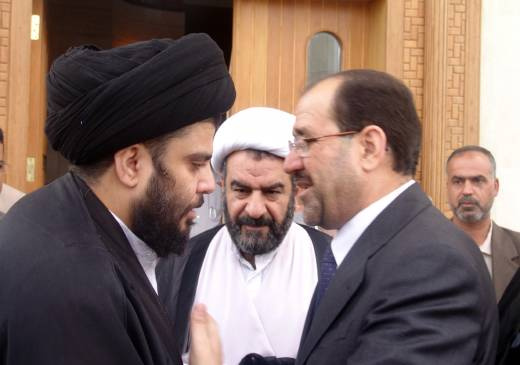The Noori Maleki-Muqtada Sadr Duel

Hossein Rooyvaran: One of the most important problems of the new constitution and, in general, the post-Saddam political system in Iraq is that the country is unfortunately involved in ethnic divisions. The fact that the president must be Kurdish, the prime minister a Shiite and the head of the parliament a Sunni Arab and, furthermore, power sharing based on this division of power, has created serious problems for Iraq. This issue is also somehow reflected in the constitution. One of the reasons behind the deadlocks in Iraq’s political system is this matter, meaning that instead of agreeing on national goals and issues and different parties competing with each other to better serve their country, each of them is, unfortunately, seeking more power. For example, recently Kurds and Sunni Arabs have united and later Muqtada Sadr joined them in order to topple the Maleki government. These kinds of religious and ethnic agreements, unity and coalitions are serious problems in Iraq’s political structure. Mr. Maleki’s main objection is aimed at these issues in Iraq’s new structure.
Regarding the issue of a no-confidence vote, it should be said that there are legal paths to achieve this goal, but so far, necessary votes have not been collected to remove the confidence in the prime minister. Maleki’s proposal is to create domestic solidarity, because the same parties who are now united against Maleki are themselves members of the ruling coalition. The Al-Dawa party, the secretary- general of which is Maleki, at least has the ministries under his control, while Sadr and Kurds and Al-Iraqiya have divided ministries amongst themselves. Even if there are objections with regard to the cabinet and its effectiveness, they are aimed at the ruling coalition and not Mr. Maleki. Therefore, targeting Maleki has no relation to the issue of effectiveness and serving Iraq, but it is rather personal enmities that sometimes turn to ethnic hostilities.
ID: Mr. Barezani has announced that a parliamentary commission has been formed to collect a no-confidence vote on Mr. Maleki and is due to begin its activities. Considering the fact that signatures for a no-confidence vote on Maleki had been collected before, how successful can this commission be in this regard?
HR: The possibility of obtaining a no-confidence vote on Maleki is less than before. There was no such a vote before. At present, conditions for reaching the necessary votes are more difficult because there is a division among Kurds. The Patriotic Front under the leadership of Jalal Talebani has no incentive to enter this process. One should say that among other groups that were active before, two groups of Sadris who have separated from the main Sadr group are not in favor of this. Therefore, Sadr’s capability to do such a thing is in practice weakened. Saudi Arabia and Qatar have allocated a considerable amount of funds for this job, but to no avail. Therefore, under the present conditions, without the existence of past ideal capabilities, the no-confidence vote will definitely go nowhere. The present Iraqi situation has been reached through agreements among groups and, for this reason, Mr. Maleki invites different groups for dialogue to put aside difficulties and come to new agreements if necessary.
ID: Muqtada Sadr’s position has changed. What is the reason for that?
HR: There is a competition between the Al-Dawa party and Sadr’s group for the leadership among Shiites. In this competition, Muqtada Sadr tries to use his vast social basis while Al-Dawa is inclined to use its more than half a century of struggle. This competition is political and all other issues related to the government’s deeds and proficiency are instruments to justify this political competition.
ID: In conclusion, is it probable that efforts to unseat Mr. Maleki will succeed?
HR: No. I think at present it is very difficult to achieve a no-confidence vote. These measures are only propaganda against Maleki’s government.

